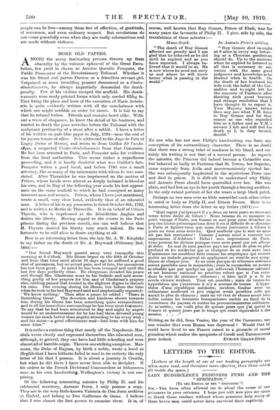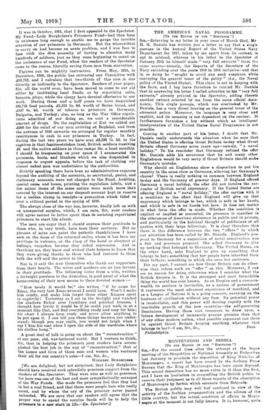LETTERS TO THE EDITOR.
(Letters of the length of one of our leading, paragraphs are of ten more read, and therefore more effective, than those which fill treble the space.1 LADY BURGHCLERE'S PRISONERS FUND AND TRH " SPECTATOR."
[To rite EDITOR OF THE " SPECTATOR."3 Sts,—You have often allowed me to plead the cause of our prisoners in your columns. I hope you will now give me space to thank those readers without whose generous help many of these brave men could never have sin-sired their captivity.
It was in October, 1915, that I first appealed to the Spectator. My Fund—Lady Bnrghclere's Prisoners Fund—bad then been in existence long enough to enable me to gauge the terrible situation of our prisoners in Germany. But the wherewithal to carry on had become an acute problem. and I was face to face with the dire necessity of having to abandon many hundreds of soldiers, just as they were beginning to count on the assistance of our Fund, when the readers of the Spectator came to the reecue, literally saving these men from starvation.
Figures can be mightily instructive. From May, 1915. to December, 1918, the public has entrusted our Committee with 451,752, and I calculate that two-thirds of this sum is due directly or indirectly to the Spectator. Readers of your paper, Sir, all the world over, have been moved to come to our aid either by instituting local funds, or by organizing sales, bazaars, plays, while the clergy have devoted offertories to our work. During three and a half years we have despatched 130,748 food parcels, 41,219 Is. 8d. worth of Berne bread, and 4847 Os. 8cL worth of tobacco to prisoners in Germany, Bulgaria, and Turkey; also, as long as the War Office regula- tions admitted of our doing so, we sent a considerable amount of drugs. On the capitulation of Kut we cabled out 4300 for the relief of our men arriving at Baghdad, and from the autumn of 1916 onwards we arranged for regular monthly remittances in cash to our prisoners in Turkey. In fact, during the last two years we have sent 43,292 is. 3d. to the captives in that famine-stricken land, British soldiers receiving 41 and the native soldiers in three camps 10s. a head monthly. I should be trespassing on your space if I enumerated the garments, boots, and blankets which we also despatched in response to urgent appeals, before the task of clothing our almost naked men was undertaken by the authorities.
Strictly speaking there have been no administrative expenses beyond the auditing of the accounts, as secretarial, postal, and stationary accounts were not charged to the Fund. Auditing, special OWNS and boxes, printing the regulation labels, and a few minor items of the same nature were much more than covered by the interest on our desposit account kept in reserve for a sudden slump in receipts—a precaution which tided us over a critical period in the spring of 1918.
The abrupt close of the war has, however, finally left us with an unexpected surplus, which, I am sure. Sir, your readers will agree cannot be better spent than in assisting repatriated prisoners to start life afresh.
The men are eager that I should express their gratitude to those who, in very truth, have been their saviours. But no phrases of mine can paint the pathetic thankfulness I have seen on the faces of the returned exiles, whom it has been my privilege to welcome, or the clasp of the hand so eloquent of feelings, unspoken because they defied expression. And in thanking me, they knew and wished their helpers to know that they were giving thanks to those who had restored to them both the will and the power to live.
Nor is it only the men themselves who thank our supporters from their hearts. The wives and mothers are no lees fervent in their gratitude. The following letter from a wife, written a fortnight previous to the Armistice, is good proof of what the homecoming of their men means to these devoted women "How lovely it would be'," she writes, "if he came for Xmas, the very beet Xmas present I could have. Won't I make him comfy, and make him forget those other Xmases spent in captivity! Yesterday as I sat in the firelight and watched the shadows flicker over furniture and polished brasses. I thought hew lovely it would be if he could just walk in at a moment like that, and find everything ready and cosy for him; his chair I always keep ready and never allow anything to be put upon it. I can toll you these things because yen under- stand; though you may smile, you would not laugh when I say I kiss his coat when I open the side of the wardrobe where his clothes hang."
A great deal of talk is going on about the " reconstruction " of our poor, old, war-bettered world. But I venture to think, Sir, that in helping the prisoners your renders have accom- plished the best job in the way of "reconstruction," that of the homes and lives of 'those men and women who ventured their all for our country's sake,—I am, Sir, &c.,
WINIFELSD DURGHCLIRJ.
[We are delighted, but not surprised, that Lady Burghclere should have received such splendidly generous support from the readers of the Spectator. They were wise as well as generous, for here was one of the best and most sympathetically managed of the War Funds. She made the prisoners feel that they had in her a real friend, and that there were people here who really cared, and by whom the cry of the prisoner never passed unheeded. We are sure that our readers will agree that the proper way to spend the surplus funds will be to help the prisoners to new start in life.—Es. Spectator.]







































 Previous page
Previous page